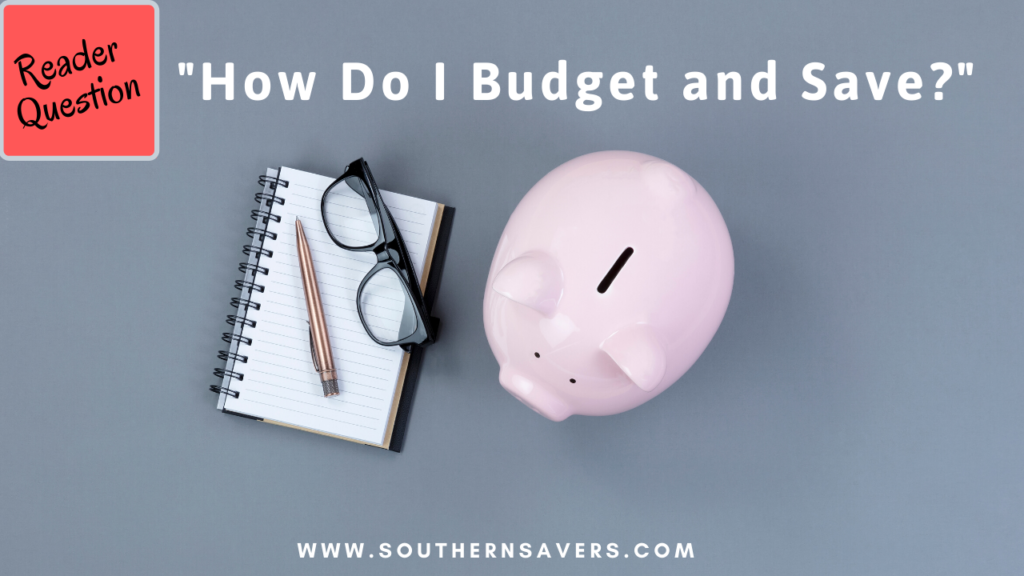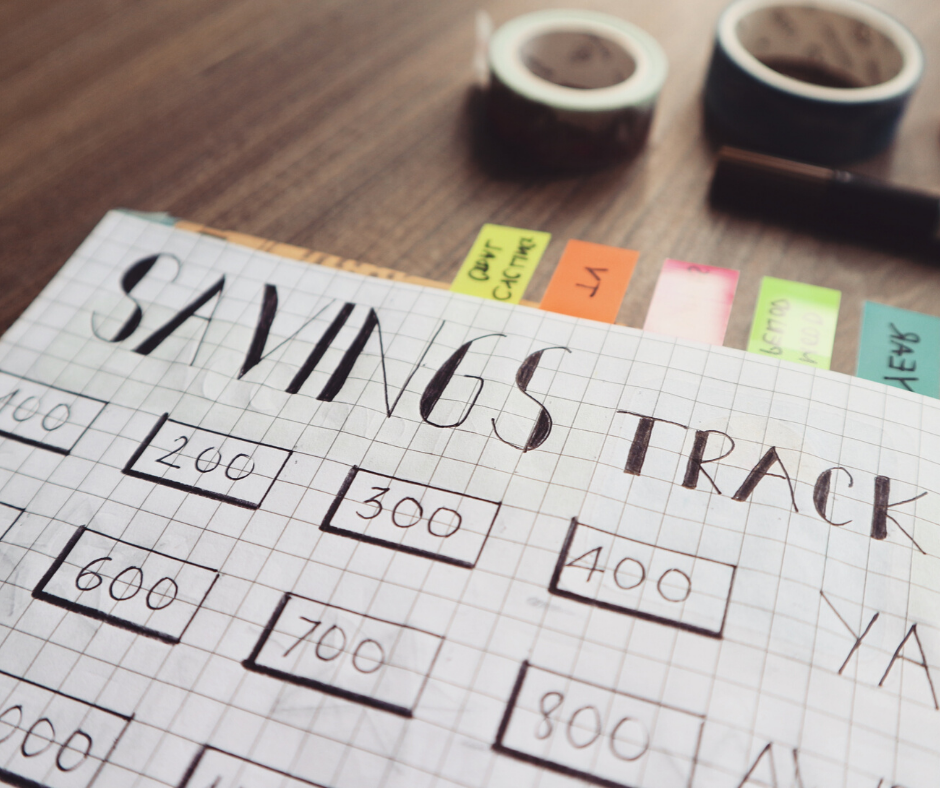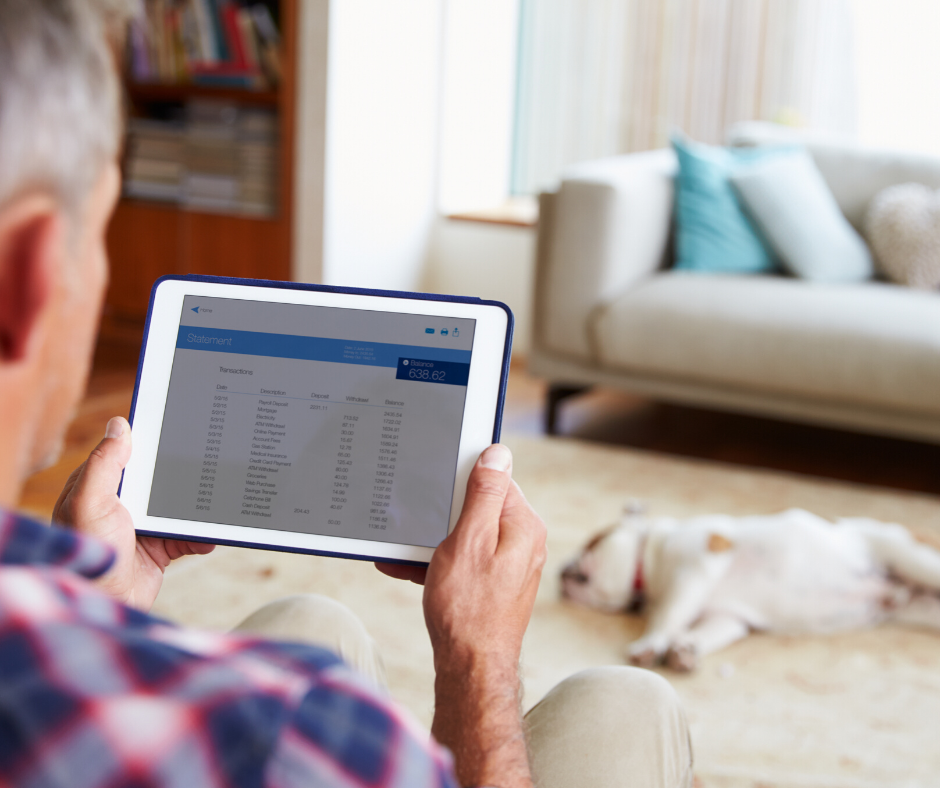This post may contain affiliate links. Read our disclosure here.

Recently a Southern Savers reader posted the following question on our Facebook page: “How do you budget and save? Our bills are paid, but I want to cut back and start saving more. Can anyone share how they save or budget?” Of course, the whole point of Southern Savers revolves around this question, so I have a ton of answers, but I always like to see what you all have to say.
As usual, there were tons of helpful responses. I’m excited to share them with you in the hopes that the original reader who asked the question—as well as anyone else—can get some new inspiration.
How to Budget and Save Money
I’ve tried to divide up the responses into different categories. I continue to be amazed at the variety of answers!
Shop at certain stores
Several readers suggested loyalty to a certain store. This can be a great idea if you focus on how that store does sales and coupons and become an expert. There are also usually rewards associated with certain store credit or debit cards.
Lori J.: “Target offers the online shopping with pick up. They offer a debit card that, if you use it at Target, saves you 5% off of anything you buy. That’s on top of sales and coupons.”
Lori G.: “I save so much time and money ordering online and just pick up on my way home from work. Kroger’s website allows you to see any available digital coupons as you select your items, too. We use the Kroger credit card so every $100 purchased gets us an additional 10 cents off gas.”
Take a Close Look at Your Utilities
Examining the different parts of your budget is another way to save money. I recently shared 24 ways to save money on utilities.
Crista A.: “Check your cable, phone, and Internet plans. We switched carriers recently, made changes on our plans, and saved a good bit. We deleted channels that we no longer watched!”
Judy D.: “Some ways we cut our expenses was getting rid of home phone and cable. We were paying for a home phone we never used except when a telemarketer called. For cable, we use the Pluto app to cast to our tv. We also installed solar panels (we are in Florida), and though we still are paying off the loan for the panels, that payment is 100+ dollars less then what we were paying without them each month.”

Automate Saving
One tip that came up a ton was to find ways to automate your saving so that you don’t even have to think about putting aside money for different things.
Molly M.: “We move money over same day we get paid, set it up as an automatic transfer online through our bank. That way we aren’t waiting to see what’s left, we don’t even really notice it missing because it’s gone before we can use it! We have an online savings account that earns higher interest and it has built quickly!”
Sarah B.: “We have savings money come directly out of my husband’s check and deposited into our brokerage account for saving/investing. That way everything that hits the checking account is for bills and discretionary spending.”
Mary E.: “Any extra money (rebates, refunds, etc.) is a bonus and should be saved. When you get a pay raise bank it before you see it with automatic deposits into savings.”
Amanda A.: “We have automatic drafts to various accounts for savings and investments. Since it’s automatic, we pay ourselves before we pay anything else.”
Tanya W.: “I’ve found the best way for me to save is to have it automatically drafted out of my check and into a savings or retirement account. If I never see it I don’t get used to it being there.”

Use Good Budgeting Resources
A previous reader question was about the best financial resources. There is some overlap with the answers to that post, so make sure you check that one out! Here are some of the responses to this question.
Erica W.: “I use the every dollar app to track spending. It helps you see where you are spending to decide where to make cuts.”
Michelle K.: “You Need a Budget is a great book and program. We had tried different things in the past and my husband teaches finance classes at our church so he read/ looked into multiple programs and YNAB was the hands down winner. I thought I would hate doing it and that it wouldn’t make a difference because I’m not a spender, but it has been life changing! Our income hasn’t increased but we have so much more money and I never gave to wait to pay bills!”
Carrie K.: “Use Mint for all your money tracking. Have a separate high yield savings account (I use Capital One 360) and set up automatic withdrawals to put money into it. You can set up for every week, biweekly, month, etc. I have one of those for each of my kids, too, for $10/mo. I don’t even miss it and then they have little nest eggs growing with high interest.
Emily A.: “I made a budget in Google Docs, and I can see where every penny is going. It helps me see where we can cut down (um, going out to eat!!) and helps me use the ‘extra’ to pay down debt.”
Brandy H.: “I use YNAB (You Need a Budget) and have for several years. It was a game changer with our finances! We are able to realistically budget but move around money if necessary & set achievable goals for saving. It’s FANTASTIC! They offer 34 days free to try it out.”
Lisa S.: “Dave Ramsey will change the way you think. We have saved so much money since taking his course. We took our teenage son through the course when he was 17, and people ask me all the time where he learned to save money.”
Donna P.: “Take a look at every thing you spend your money on. Write it down for a monthy—what you purchased and how much. Reflect to see if in your spending you can reduce. Also, look at every bill you pay in its entireity. Sometimes companies sneak charges in on you for things you know nothing about.”

Managing Money in Creative Ways
Some of you had some great ideas to save money in really creative ways that couldn’t really be categorized. Sometimes it’s just helpful to look at your money from a new perspective!
Cindy M.: “We have a second savings account at our bank and we put money in it from each paycheck to save for the bigger bills or for emergencies. This is usually done after the bills are done. Of course, for me having something specific helps me save money. Right now, I am trying to figure out how to take a family vacation this summer.”
Kimberly M.: “I use a calendar; I write in red ink the date the bills are due. Then, on the day I get paid, I pay the bills coming due the following week. If I budget my money, I find myself able to pay bills several weeks in advance. Selling things I don’t need gives me spending money.”
Amanda P.: “I am saving every $5 and $1 bill I get this year towards Christmas.”
Cindy F.: “Equate what you want to one hour at a part-time job—even if you have a full time salaried job. Would you spend an hour or more of your life away from your family for it? It puts impulsive spending in perspective.”
RoxAnne B.: “Stop shopping just for ‘browsing.’ Then, you’ll stop a lot of impulse buying. Pay for everything with cash. Do not use credit cards unless you HAVE to.”
Bridgette G.: “A zero-based budget, where every dollar has been given a job before it’s received, keeps me in good financial shape.”
Dana G.: “We have 2 checking accounts. The first holds money for monthly bills; the second for annual bills. When we budget, we determine how much money needs to be placed in the annual account, divide by 24 and then deposit that amount into the annual account each paycheck. The annual account includes items like estimated car/home repairs, birthday & holiday presents, car insurance, estimated vet bills, etc. This way we always have cash available for these expenses and do not need to dip into savings when the bill arrives.”
Judy D.: “Unconventional, but I have a lot of bank accounts. I have my paycheck divided up into them based on what they are for… one for each kid (2 still at home) and that pays for their birthday party each year. One account is monthly bills, another is mad money, a house savings for any fees or repairs throughout the year. I then only look at the bills account and mad money account and forget about the rest until it’s time to use the money in those accounts.”
Gina O.: “We make a financial forecast on January 1st each year on a spreadsheet and do a check and balance every Saturday morning before doing the weekly shopping. This helps us plan ahead for vacation, birthday, anniversary and holiday expenses as well as set aside medical deductible for each family member, estimate utility expenses based on previous year and an ‘everyday living budget’ for groceries/gas/dining out. We try to pay extra on our mortgage when the budget allows and put our tax refund minus property tax and homeowners insurance straight into savings. It’s a few hours work on New Year’s Day but keeps us on track and meeting our goals.”
Michelle T.: “Put your savings into an account that does NOT offer a card. Not having easy access will help deter you from withdrawing.”

Saving Money on Food
Spending on food is an area of the budget that can almost always be cut to some degree. These readers had some great ideas to save money on food!
Stacy V.: “If you work outside the home, take your lunch. Not only will it save you money, it will give you the opportunity to relax instead of rushing around to get your food. It’s a challenge at first, but if you make a few extra portions when you cook dinner, you can package it up and put it in the fridge when you’re cleaning up and you’ll be ready to grab and go.”
Amy C.: “Online grocery order with pickup. Make a menu for the week and just buy what you need for that week. Stops impulse buys and buying extra food when you’re hungry.”
Ally L.: “Groceries and eating out are our biggest places to save money or blow our budget. We meal plan and I use cash and act like my debit card isn’t an option. I have slacked with couponing and combining deals lately, but I’ve also noticed a huge difference because of it. Cash-flowing our eating out helps tremendously, as well.”
Benita R.: “Every January we do a fast food fast. We spend a lot on fast food and eating out. It’s nice to start the year eating through the pantry and saving money.”
Jodie C.: “I’ve been told by many to use the online shopping apps at Kroger and Walmart to order your groceries and pick them up Vs shopping yourself in the store to stop impulse buying. Also to do meal planning helps since you only buy what you need for the week. Doing it online you know exactly how much you’ll spend so makes it easier to stay on budget.”
Emily C.: “Watch how much you spend on fast food. Even if you’re eating off of the dollar menu it adds up. I meal prep a lot during the work week so I’m not spending at vending machines.”

Miscellaneous Tips
Finally, here are some ideas that don’t fit neatly into any category but that are still great!
Paula B.: “One way I save is ordering online and picking up or doing delivery; I meal plan and shop according to that. This reduces buying on impulse. I also invested in cloth menstrual pads and use those; it was a investment, but a great save—they’ve lasted five years. I also make mine now. Couponing is good. Turn off lights and unplug things not in use because it still drains energy. I turn of my hot water on the breaker box during the day; it still has hot water in it through the day. And before showers I cut the hot water on thirty minutes before hand.”
Anna F.: “We quit buying Starbucks coffee, cut back on buying lunch and took our lunch more often. Used up what was in the pantry and fridge before buying more. Buy on clearance and stock up on BOGO. I recently ditched Publix and Kroger to shop at Aldi. I also have been using Fetch Rewards to collect points so that I can earn money back in the form of gift cards.”
Karen R.: “Years ago… I got laid off and we were down to one salary. It also meant I got to stay home with my kids, which is better than money. When I did go back to paid work, we still lived on one salary and used my income to pay off the principal of our house loan. We also only buy used cars. We check them out thoroughly before we buy, and we pay in cash.”
Venita L.: “We shop a lot with cash. We get money from the ATM every 3 weeks or so. The money is ours to do what we want/need to. When it’s out, we go without.”
If you missed the chance to chime in on Facebook, let us know in the comments how you’d answer this reader question!



